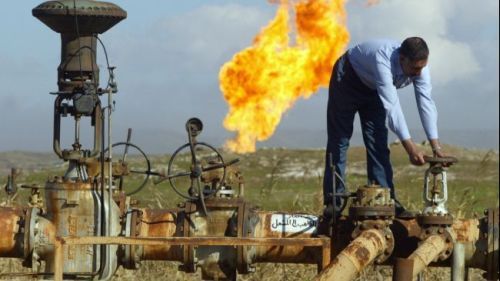
As Sunni insurgents of the militant Islamic State of Iraq and the Levant (ISIS) threaten civilians in northern Iraq, recipients of the country’s crude oil production are jittery over the effect it may have on barrel prices worldwide.
Brent crude oil, the international benchmark used to price oil shipped to Western countries from Africa, Europe and the Middle East, has jumped to $113 per barrel recently, hitting the highest price seen since September 2013, and futures quotes for Brent crude have been rising steadily over the past year.
A Crude Overview of Oil Extraction and Refining
Unrefined crude oil is extracted by means of drilling from oil fields, and the raw material is then exported through pipelines or by tankers to international refineries. Crude is unusable in its raw form, and must be chemically altered to separate complex compounds of hydrocarbons into publicly used oil products. It is then separated and purified into a variety of useful materials, from gasoline to jet fuel.
Once received via pipeline or oil tanker, crude oil makes its way through a refinery plant in a matter of hours, with the final product filling tanks and ready for shipment between 12-24 hours later. Distributors then hold the fuel for one-to-three weeks before it is shipped; once on a delivery tank truck, shipments reach gas stations within 12 hours. The entire process, from underground to pump, averages three-to-four weeks.
Russia is currently the world’s top oil producer. It has been confirmed that Iraq contains the fifth-largest oil reserves in the world, and it is the second-largest producer in the Organization of Petroleum Exporting Countries (OPEC).
Iraq’s Place in Global Crude Oil Production
Though Iraq produces less than 5 percent of the 90 million barrels of oil extracted per day, rising prices are a symptom of widespread conflict throughout the Middle East.
At the rate measured in 2013, Iraq was reported to collect 7.3 barrels of crude oil daily per square kilometer. An OPEC April 2014 estimate placed Iraqi oil production at 3.3 million barrels per day, or 3.75 percent of the global supply.
Though a modest contribution in the shadow of Russia and Saudi Arabia, a benign, conflict-free Iraq could export up to 6 million barrels per day reported analysts at the International Energy Agency. It quickly boosted production to its current levels post-War in Iraq, and has since surpassed its previous record in 1989 of 2.9 million barrels per day.
However, Islamic militants are well aware of oil’s value. Pipelines, the arteries that connect extraction fields to refineries and shipping ports, are often sabotaged by insurgents. Damage done to one particular pipeline that runs the 600 miles from Kirkuk in north Iraq to Ceyhan in Turkey has disrupted oil shipping to the tune of 250,000 barrels a day. As Iraq’s largest crude export line, it was expected to be repaired and back online this year; recent conflict has again placed the pipeline on hold.
Militants’ effects on Iraq’s health as a country and key exporter are significant, but attacks have not yet reached the country’s southern oil fields. These reserves produce 75 percent of Iraq’s output and have as of yet remained safe from sabotage.
The Kurdish region to the north of Iraq reported the potential to increase output from its current 400,000 barrels per day to 1 million barrels by 2015, jumping to double that by 2019. There has been a significant influx of foreign investment into the region, boosting per capita GDP from $800 in 2004 to $5,600 in 2012. However, its location relative to Islamist conflict has forced the region to stretch security forces thin, hindering efforts to increase oil production and export.
Effects on Summer Demand and Supply
A number of other oil-producing countries are currently facing unrest, and consumers across the globe are feeling the effects. Since the beginning of a devastating civil war, Libya’s oil output is down 90 percent. Syria, Nigeria, and Venezuela face similar challenges.
Additionally, Norway may see up to a 7-percent drop in oil production — around 100,000 barrels per day — should oil workers fail to reach a wage deal with oil facility directors, which is expected to spark a strike. Though Norway is a small oil producer, strikes in 2010 cut Norwegian oil supply by 13 percent and helped to push global oil prices above $100 per barrel.
Crude oil giant Saudi Arabia, as well as Kuwait and the United Arab Emirates are expecting to increase oil production to meet the increased demand of the summer months, but analysts estimate these countries will only be able to pick up the slack by 2 million barrels per day. Saudi Arabia currently holds 1.96 barrels per day in spare capacity, which means the country faces the most pressure to cover what is being lost in Iraqi production.
Source: Equities
We use cookies to improve your experience. By continuing to use our site, you accept our Cookies, Privacy Policy,Terms and Conditions. Close X